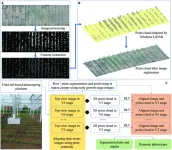(Press-News.org) The report, “Wrestling with Social and Behavioral Genomics: Risks, Potential Benefits, and Ethical Responsibility,” produced by The Hastings Center, a bioethics institute, provides direction for research and communications in this area of study with both significant social risks and potential benefits. It is accompanied by an article that describes a fledgling effort to integrate community perspectives on the ethics of this research.
A webinar to launch the consensus report will take place today at 3 PM EST. Register here.
Research on genetic variants and human social and behavioral characteristics, or phenotypes, including anxiety, subjective well-being, and educational attainment, is increasing. And there is ongoing concern about its misinterpretation and misuse. The report, developed as part of a three-year project, describes the scientific terrain, and puts the potential benefits and risks of such research in historical and social context.
In light of that analysis, the report offers recommendations for how such research can be done responsibly and concludes that research on sensitive social and behavioral phenotypes that attempts to compare groups defined by race, ethnicity, or genetic ancestry (where genetic ancestry could easily be misunderstood as race or ethnicity) would require a compelling justification to be ethically conducted, funded, or published. This justification requires at least a convincing argument that the study’s design could yield scientifically valid results; some of the report’s authors would also require the study to have a socially favorable risk-benefit profile.
The report is a consensus document from a working group of 19 leading scholars who conduct social and behavioral genomics research and/or think critically about it.
The project was led by Erik Parens, a senior research scholar at The Hastings Center, and Michelle N. Meyer, an associate professor and chair of the Department of Bioethics & Decision Sciences at Geisinger.
Areas of Consensus
The group agreed that social and behavioral genomic research has the potential to yield benefits, such as improving social science and clinical trials by using genomic data as control variables; advancing health research; better understanding environmental causes and the limits of genomic influence; and, through these, indirectly improving policies. The group also agreed that this research has risks, such as increasing stigma and discrimination against individuals; distracting policy-makers from more effective ways of understanding or addressing the phenomena investigated by such research; and promoting the erroneous view that the status quo is inevitable or that environmental interventions are futile.
Two kinds of research were identified as warranting special consideration because they are “more ethically fraught than others.”
Research of heightened concern involves sensitive characteristics that are: very consequential to social status, part of a stereotype that threatens to reify the biologization of social identities, and/or central to a minoritized group’s identity. Examples include: obesity, substance use disorders, intelligence, educational attainment, income, and criminalized behaviors. “At a minimum, heightened obligations of responsible conduct and communication of this research apply,” the report states.
Research of greatest concern is any study (1) on sensitive characteristics that (2) would compare groups defined by (a) race, (b) ethnicity, or (c) genetic ancestry, where genetic ancestry could easily be misunderstood as race or ethnicity (“group-comparison research”). “All members of the working group have serious doubts about the scientific validity of group comparison research today regarding [social and behavioral genomic] phenotypes,” the report states. “And we all agree that—considering the social risks of group-comparison research—scientific validity should be an ethical precondition of conducting, funding, or publishing it.”
Area of Disagreement
The working group disagreed about whether additional, nonscientific justifications (beyond assurances of responsible conduct and communication) would be needed to justify group-comparison research on sensitive traits if that research is scientifically valid. At present, group comparison research is not scientifically valid. But, if it proves valid in the future, should group comparison of sensitive phenotypes proceed? “While some of us believe that researchers should be free to pursue any scientifically valid research, others of us would additionally require a compelling justification of the study’s risk-benefit profile” the report states.
Research Recommendations
• Engaging with stakeholders
• Justifying the use and definition of “populations”
• Justifying phenotype definition and measurement
• Conducting studies with adequate power
• Replicating findings in hold-out samples
• Conducting within-family analyses, if possible
• Extending research benefits to diverse people
Communications Recommendations
• Developing a “key-points” box that includes how results should(n’t) be (mis)interpreted or (mis)used
• Further diverting misinterpretations or misuse via FAQs, videos, and careful press releases
• Reporting effect sizes in the abstract and avoiding exaggerating them, including in graphs
• Embedding caveats and context in graphs and tables
• Defining and justifying the use of “populations”
• Moving away from population language that is easily conflated with race or ethnicity
The articles are published in The Ethical Implications of Social and Behavioral Genomics, a Hastings Center special report.
The project was funded by the Robert Wood Johnson Foundation, Russell Sage Foundation, and JPB Foundation. Additional support comes from Open Philanthropy and The Gil Omenn and Martha Darling Fund for Trusted and Trustworthy Scientific Innovation, a Hastings Center fund.
Working Group
Co-Principal Investigators
Erik Parens, The Hastings Center
Michelle N. Meyer, Geisinger
Steering Committee
Paul S. Appelbaum, Columbia University
Sandra Soo-Jin Lee, Columbia University
Daphne Oluwaseun Martschenko, Stanford University
Additional Members of the Working Group
Daniel J. Benjamin, University of California, Los Angeles
Shawneequa L. Callier, George Washington University
Nathaniel Comfort, Johns Hopkins University
Dalton Conley, Princeton University
Jeremy Freese, Stanford University
Nanibaa’ A. Garrison, University of California, Los Angeles
Evelynn M. Hammonds, Harvard University
K. Paige Harden, University of Texas at Austin
Alicia R. Martin, Harvard University,
Benjamin M. Neale, Harvard University
Rohan H. C. Palmer, Emory University
James Tabery, University of Utah
Eric Turkheimer, University of Virginia
Patrick Turley, University of Southern California
For more information, contact:
Susan Gilbert
Communications Director
The Hastings Center
gilberts@thehastingscenter.org
845.424.4040 x244
END
New report makes recommendations on controversial genetics research
Working group wrestles with ethical implications of social and behavioral genomics; launch event today
2023-04-24
ELSE PRESS RELEASES FROM THIS DATE:
Multiple-model GWAS identifies optimal allelic combinations of quantitative trait loci for malic acid in tomato
2023-04-24
The objective of this study is to identify these loci and decipher the polygenic architecture of malic acid content in tomato fruit. The authors carried out a GWAS using six milestone models with two-environment repeats. A series of associated SNP variations were identified from GWAS, and 15 high-confidence annotated genes were obtained based on the lead SNPs and the malic acid accumulation. The optimal allelic combination of the 15 loci was presented for tastier tomato. ...
120-year-old storm’s secrets key to understanding weather risks
2023-04-24
A severe windstorm that battered the UK more than a century ago produced some of the strongest winds[OS1] that Britain has ever seen, a team of scientists have found after recovering old weather records.
Old weather measurements, first recorded on paper after Storm Ulysses hit the UK in February 1903, have shed new light on what was one of the most severe storms to have hit the British Isles.
By turning hand-written weather data into digital records, the research team has laid the way to better understand other historical storms, ...
New phenotyping approach analyzes crop traits at the 3D level
2023-04-24
The steady decline in cultivable land owing to the rapidly increasing global population has necessitated the use of efficient plant breeding methods that could be used to improve agricultural yields. However, in addition to genetic methods, we need approaches to control and improve complex crop traits. To this end, plant scientists make use of various cutting-edge imaging techniques that quantify crop traits (height, leaf shape, leaf color, etc.). Traditional imaging methods, however, are tedious, destructive, and non-sustainable. ...
Masashi Watanabe to receive 2023 Microanalysis Society Presidential Science Award
2023-04-24
Lehigh University materials science and engineering (MSE) professor Masashi Watanabe is the 2023 recipient of the Microanalysis Society Presidential Science Award, which recognizes a senior scientist for “outstanding technical contributions to the field of microanalysis over a sustained period of time.”
Watanabe is a Fellow of the Microanalysis Society and a former MAS president. The career achievement honor highlights his work in advancing quantitative analysis in scanning transmission ...
Transforming highways for high-speed travel and energy transport
2023-04-24
WASHINGTON, April 24, 2023 – Superconductors can conduct electricity without any resistance or power loss, and they can effortlessly cause magnets to levitate above them. These properties would make superconductors useful for high-speed trains or long-distance power transmission, except for one glaring problem: superconductors only work at low temperatures, more than a hundred degrees below zero.
This one requirement makes building a hyperefficient electrical grid or high-speed rail network very expensive. Unless, that is, a superconductor network could accomplish ...
Characterizing the contaminated couriers of omicron SARS-CoV-2 variants
2023-04-24
HIGHLIGHTS
SARS-CoV-2 may spread through contaminated shipping containers
How long Omicron variants persist on shipping materials may be influenced by temperature, humidity and material
Researchers measured the viability of BA.1 and BA.5 Omicron variants on 4 shipping materials
The virus was most stable, and most likely to spread, at the lowest temperature.
Washington, DC – The virus that causes COVID-19 spreads through droplets and small particles, but contaminated surfaces of shipping materials ...
Sliding out of my DMs: young social media users help train machine learning program to flag unsafe sexual conversations on Instagram
2023-04-24
In a first-of-its-kind effort, social media researchers from Drexel University, Vanderbilt University, Georgia Institute of Technology and Boston University are turning to young social media users to help build a machine learning program that can spot unwanted sexual advances on Instagram. Trained on data from more than 5 million direct messages — annotated and contributed by 150 adolescents who had experienced conversations that made them feel sexually uncomfortable or unsafe — the technology can quickly and accurately flag risky DMs.
The project, which was recently published by the Association for Computing Machinery in its Proceedings of the ACM on Human-Computer Interaction, ...
Study points to cause of safety concerns in widely used painkiller diclofenac
2023-04-24
SPOKANE, Wash.—Safety concerns related to the widely used painkiller diclofenac may be tied to a little-studied drug-metabolizing enzyme whose expression can vary as much as 3,000 times from one individual to the next, according to new research.
Published in the journal Clinical Pharmacology & Therapeutics, findings from the study could be used to develop ways to identify individuals at risk of serious side effects from diclofenac and to determine safer dosing standards for specific populations, including women, young children and people of certain ethnicities.
Used to combat pain and inflammation ...
Cryo-imaging lifts the lid on fuel cell catalyst layers
2023-04-24
Proton-exchange membrane fuel cells (PEMFC), which are being developed for use in electric vehicles, rely on nanoparticles called catalysts to trigger electricity-producing reactions between hydrogen and oxygen. Most PEMFC catalysts contain platinum – a scarce and precious metal. There is therefore a pressing global need to develop catalysts that can generate the most power while minimizing platinum content.
Manufacturers integrate these catalysts in complex assemblies called catalyst layers. Until now, they had to do so without a detailed picture of the resulting structure, as traditional imaging processes almost always cause some degree of damage. Vasiliki Tileli, head ...
Study finds significant variation in anatomy of human guts
2023-04-24
New research finds there is significant variation in the anatomy of the human digestive system, with pronounced differences possible between healthy individuals. The finding has implications for understanding the role that the digestive tract’s anatomy can play in affecting human health, as well as providing potential insights into medical diagnoses and the microbial ecosystem of the gut.
“There was research more than a century ago that found variability in the relative lengths of human intestines, but this area has largely been ignored since then,” says Amanda Hale, co-first author of the study and a Ph.D. ...
LAST 30 PRESS RELEASES:
Power in motion: transforming energy harvesting with gyroscopes
Ketamine high NOT related to treatment success for people with alcohol problems, study finds
1 in 6 Medicare beneficiaries depend on telehealth for key medical care
Maps can encourage home radon testing in the right settings
Exploring the link between hearing loss and cognitive decline
Machine learning tool can predict serious transplant complications months earlier
Prevalence of over-the-counter and prescription medication use in the US
US child mental health care need, unmet needs, and difficulty accessing services
Incidental rotator cuff abnormalities on magnetic resonance imaging
Sensing local fibers in pancreatic tumors, cancer cells ‘choose’ to either grow or tolerate treatment
Barriers to mental health care leave many children behind, new data cautions
Cancer and inflammation: immunologic interplay, translational advances, and clinical strategies
Bioactive polyphenolic compounds and in vitro anti-degenerative property-based pharmacological propensities of some promising germplasms of Amaranthus hypochondriacus L.
AI-powered companionship: PolyU interfaculty scholar harnesses music and empathetic speech in robots to combat loneliness
Antarctica sits above Earth’s strongest “gravity hole.” Now we know how it got that way
Haircare products made with botanicals protects strands, adds shine
Enhanced pulmonary nodule detection and classification using artificial intelligence on LIDC-IDRI data
Using NBA, study finds that pay differences among top performers can erode cooperation
Korea University, Stanford University, and IESGA launch Water Sustainability Index to combat ESG greenwashing
Molecular glue discovery: large scale instead of lucky strike
Insulin resistance predictor highlights cancer connection
Explaining next-generation solar cells
Slippery ions create a smoother path to blue energy
Magnetic resonance imaging opens the door to better treatments for underdiagnosed atypical Parkinsonisms
National poll finds gaps in community preparedness for teen cardiac emergencies
One strategy to block both drug-resistant bacteria and influenza: new broad-spectrum infection prevention approach validated
Survey: 3 in 4 skip physical therapy homework, stunting progress
College students who spend hours on social media are more likely to be lonely – national US study
Evidence behind intermittent fasting for weight loss fails to match hype
How AI tools like DeepSeek are transforming emotional and mental health care of Chinese youth
[Press-News.org] New report makes recommendations on controversial genetics researchWorking group wrestles with ethical implications of social and behavioral genomics; launch event today





